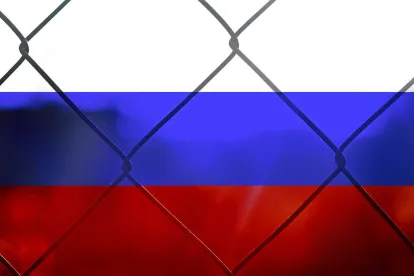Introduction
On Oct. 6, 2022, the Council of the European Union (EU) adopted a new, eighth package of measures (Package) primarily intended to reinforce pressure on the government of the Russian Federation (Russia) and Russia’s economy, weaken Russia’s military capabilities and impose additional consequences on the Kremlin for the recent escalation of the conflict in Ukraine.
The Package consists, inter alia, of new EU imports bans worth EUR 7 billion to restrict Russia’s revenues, additional export restrictions and the basis for the required legal framework to implement the oil price cap envisaged by the Group of Seven leading industrial nations (G-7). In addition, the Package widens the scope of services that no longer can be provided to the government of Russia or legal persons established in Russia. These new and revised provisions came into force Oct. 6, the day following their publication in the Official Journal of the EU.
Notably, the EU did not agree on whether or how to cap natural gas prices.
Companies (potentially) subject to EU sanctions jurisdiction should assess whether the amendments and clarifications included in the Package impact their business activities and compliance obligations.
Summary of EU’s Eighth Sanctions Package
Export restrictions
First, an extension of the list of restricted items which might contribute to Russia’s military, industrial and technological enhancement, as well as its ability to develop its defense and security sector. For example, the expanded list includes coal, certain electronic components (found in Russian weapons) and chemicals. These items may no longer be exported to Russia. Further, pursuant to the EU’s anti-torture Regulation, the Package adds a prohibition on exporting small arms and other goods.
Second, a prohibition on the sale, supply, transfer or export of listed firearms, their parts and essential components and ammunition, whether or not originating in the EU, to any natural or legal person, entity or body in Russia or for use in Russia. In addition, a prohibition on providing technical assistance, brokering services, financing or financial assistance or other services related to these goods.
Third, restrictions on the sale, supply, transfer or export of additional goods used in the aviation sector.
Import restrictions
Fourth, further extending the import ban on steel products that either originate in Russia or have been exported from it, including a prohibition on importing, inter alia, Russian finished and semi-finished steel products (semi-finished products are, however, subject to a transition period). In addition, the Package prohibits importing additional items that generate significant revenues for Russia, including items like wood pulp and paper, certain elements used in the jewelry industry, certain machinery and chemical items and cigarettes.
Services
Fifth, tightening the existing prohibition on providing services to Russia related to crypto assets by banning all crypto-asset wallets, accounts, or custody services, irrespective of the amount of the wallet (previously, up to EUR 10,000 was allowed).
Furthermore, the Package widens the scope of (business-relevant) services that no longer can be provided to the government of Russia or legal persons established in Russia. Since June 4, 2022, there has been in place a prohibition on providing accounting, auditing, including statutory audit, bookkeeping or tax consulting services, or business and management consulting or public relations services. The Package widens this scope to consultancy, legal advisory, engineering and architecture services.
-
‘Architectural and engineering services’ covers both architectural and engineering services as well as integrated engineering services, urban planning and landscape architectural services and engineering-related scientific and technical consulting services.
-
‘IT consultancy services’ covers consultancy services related to the installation of computer hardware, including assistance services to the clients in the installation of computer hardware (i.e., physical equipment) and computer networks, and software implementation services, including all services involving consultancy services on, development of and implementation of software.
-
‘Legal advisory services’ covers the provision of legal advice to customers in non-contentious matters, including commercial transactions, involving the application or interpretation of law; participation with or on behalf of clients in commercial transactions, negotiations and other dealings with third parties; and preparation, execution and verification of legal documents. ‘Legal advisory services’ does not include any representation, advice, preparation of documents or verification of documents in the context of legal representation services, namely in matters or proceedings before administrative agencies, courts or other duly constituted official tribunals, or in arbitral or mediation proceedings.
EU legislation provides basis to effect an oil price cap
Sixth, the implementation of a ‘price cap derogation’ related to maritime transport which allows European operators to undertake and support the transport of Russian oil to third countries, provided its price remains under a pre-set cap. This measure is tightly coordinated with G-7 partners and should help to further reduce Russia’s revenues, while keeping global energy markets stable through continued supplies. It may likewise help address inflation and keep energy costs stable.
For crude oil, the price cap would take effect after Dec. 5, 2022, and for refined petroleum products after Feb. 5, 2023.
Russian state-owned or controlled entities
Seventh, expanding the prohibition on engaging in any transaction with certain Russian state-owned or controlled legal person, entities or bodies, by including a ban on EU nationals from holding a post on the governing bodies of those persons, entities or bodies.
Eighth, adding the Russian Maritime Register of Shipping to the list of Russian state-owned or controlled entities subject to the transaction ban. The Russian Maritime Register of Shipping is a 100% state-owned entity which performs activities related to the classification and inspection, including in the field of security, of Russian and non-Russian ships and crafts. In addition, the port access and lock ban in the territory of the EU is extended to vessels certified by the Russian Maritime Register of Shipping.
Extension of geographical scope
Ninth, an extension of restrictions to the Ukrainian regions of Kherson and Zaporizhzhia. This means that the geographical scope of the restrictive measures introduced on Feb. 23 (for details see Feb. 28 GT Alert) also covers the non-occupied areas of Zaporizhzhia and Kherson.
Asset freezes
Tenth, in addition to the economic sanctions set out above, through Regulation (EU) 2022/1905, the Council has added around 30 persons and seven entities responsible for actions undermining or threatening the territorial integrity, sovereignty, and independence of Ukraine to the EU asset-freeze list. This targets, inter alia, those involved in the sham “referenda” (for example, the Central Election Commission of Russia) and individuals and entities that work in the defense sector.
In addition, the Council broadened the listing criteria on which specific designations can be based, thus allowing it to sanction persons who facilitate circumvention. This includes circumvention by EU citizens.




 />i
/>i

